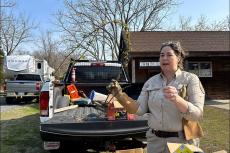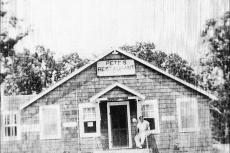By Karl Grossman
Dr. Martin Shepard, a psychiatrist, author, and, with his wife, Judith Shepard, trailblazing publisher, died with his family around him at home in Noyac on Dec. 17. He was 86 and had been ill for a short time.
In a 2011 interview with Norm Goldman, a book critic, on the Bookpleasures website, Mr. Goldman said that the Shepards' Permanent Press was committed "to publishing works of social and literary merit and has, over the decades, gained a reputation as one of the finest independent presses in America."
"My previous experience in publishing was as an author, having written 10 books for major publishers," Dr. Shepard said then of how he and his wife started the press in 1978. "Nine were nonfiction and all had to do with psychiatry: a biography of Fritz Perls and Gestalt therapy ('Fritz'), a self-help book ('Do-It-Yourself Psychotherapy'), a book about coping with death ('Dying: A Guide for Helping and Coping'). . . ."
He decided that he wanted to "revive an out-of-print book" and "when none of my publishers wanted to reissue it, we decided to do it ourselves. . . . So that's how we began, starting two imprints: Second Chance Press and the Permanent Press."
"It was an extension of my own lifelong sense of rebelliousness from arbitrary and misguided authority," Dr. Shepard went on.
It was "the same impulse that led me into political activism earlier in life to protest against the Vietnam War, when Lyndon Johnson wanted to call me up in the doctors draft, and my reaction was to get rid of him. So, I co-founded Citizens for Kennedy/Fulbright -- the first 'dump Johnson' movement. We had chapters in 15 states, preparing to deny L.B.J. renomination, and eventually Johnson retired."
He and Mrs. Shepard, who survives him, would choose to publish "books we enjoyed reading, either because we enjoyed the quality of the writing (Heywood Hale Broun's 'A Studied Madness' and Mitchell Goodman's 'The End of It'), uniqueness of story (Richard Lortz's 'The Valdepenas'), or learned something we hadn't known much about before (Julian Schuman's 'China: An Uncensored Look')."
"Now, we have over 5,000 queries coming in each year," he continued, and "we still look for stories that excite us in these ways."
Dr. Shepard grew up in Queens and attended the High School of Music of Art in Manhattan. After graduating from New York University, he went on to the N.Y.U.-Bellevue Medical School, doing his residency in psychiatry at Mount Sinai Hospital and analytical training at the William Alanson White Institute of Psychiatry, Psychoanalysis, and Psychology.
He worked as a consulting psychiatrist for the New York City Department of Corrections and the city's board of education.
His first marriage ended in divorce. He met the former Judith Kercheval in an elevator in the apartment building where he was living on West 96th Street in Manhattan as he was doing political canvassing. She lived in the same building. The next day, they went on their first date. They were married 48 years ago.
After summering on the South Fork, they moved full time to a house off Noyac Road. It would also serve as the base for their publishing enterprise.
Books they have published have received national awards, and the Permanent Press has been honored for literary excellence and editorial achievement.
In addition to his wife, Dr. Shepard is survived by their four sons, Marc Shepard, Richard Shepard, Aaron Kercheval, and Caleb Kercheval, their daughter, Liza Kercheval, and 10 grandchildren.




